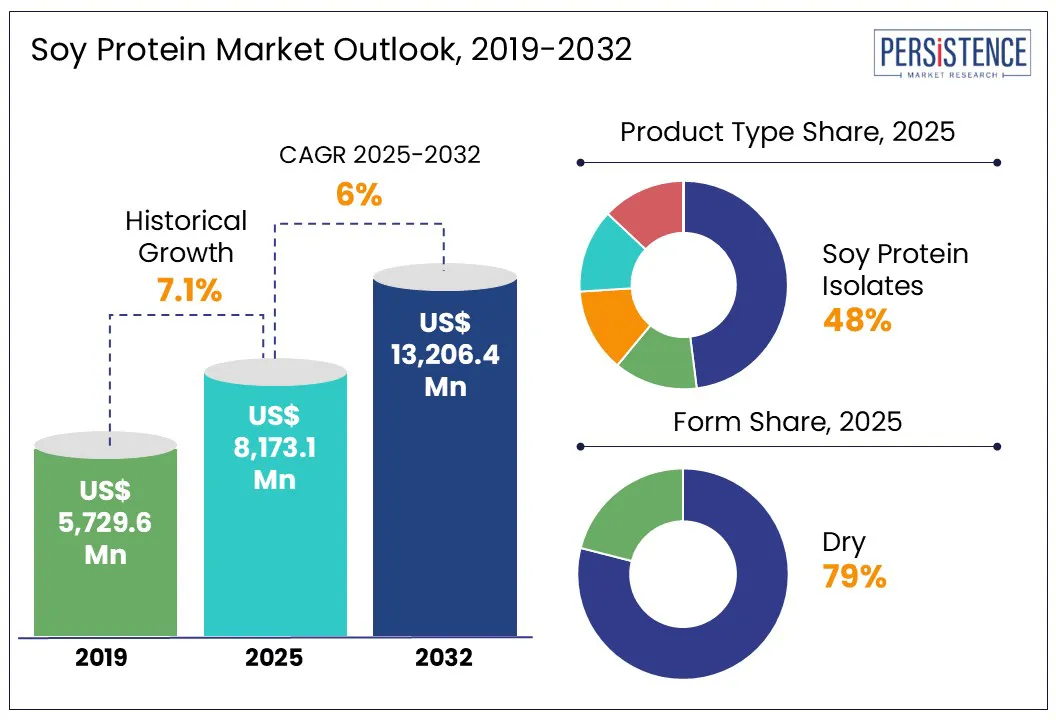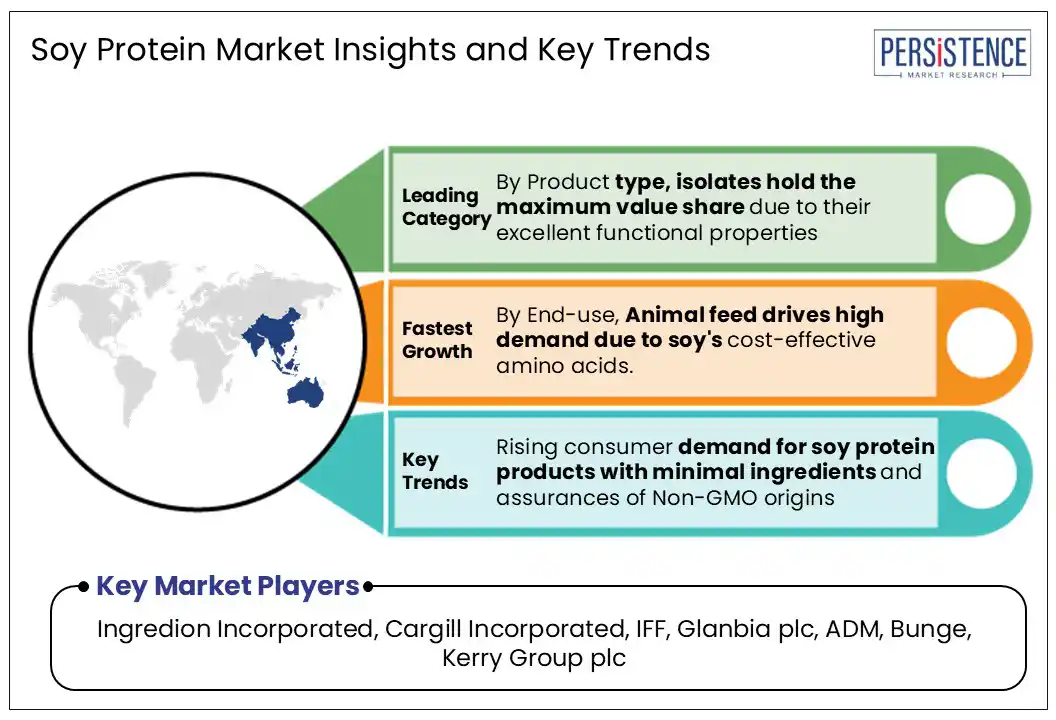ID: PMRREP27154| 198 Pages | 23 Jun 2025 | Format: PDF, Excel, PPT* | Food and Beverages

The Global Soy Protein Market size is likely to be valued at US$ 8,173.1 million in 2025 and is expected to reach US$ 13,206.4 million by 2032, growing with a CAGR of 7.1% during the forecast period from 2025 to 2032.
According to Persistence Market Research, the soy protein market is evolving rapidly as sustainability, clean-label demand, and functional food innovation reshape protein sourcing. With rising interest in plant-based nutrition, soy protein's versatility across human and animal nutrition positions it as a cornerstone in the future of global protein systems.

Key Industry Highlights:
|
Global Market Attribute |
Key Insights |
|
Global Soy Protein Market Size (2025E) |
US$ 8,173.1 Mn |
|
Market Value Forecast (2032F) |
US$ 13,206.4 Mn |
|
Projected Growth (CAGR 2025 to 2032) |
7.1% |
|
Historical Market Growth (CAGR 2019 to 2024) |
6.0% |
Awareness of plant-based proteins is a key driver in the soy protein market, as health-conscious and environmentally aware consumers increasingly shift away from animal-based products. Soy protein stands out for its complete amino acid profile, affordability, and versatility across food, beverage, and supplement categories. As plant-based lifestyles become more mainstream, driven by vegan, vegetarian, and flexitarian dietary trends soy protein continues to gain traction in everything from dairy alternatives to meat substitutes. Additionally, the rising prevalence of lactose intolerance and the growing demand for clean-label products have made soy an appealing non-dairy protein source. According to ADM, global soy production has more than doubled in less than 20 years, reflecting the surging demand from both the food industry and animal feed sectors. This rapid growth highlights soy’s strategic importance in meeting global protein needs, especially as plant-based innovation accelerates in both developed and emerging markets.
The widespread occurrence of soy allergies significantly constrains the soy protein market. Soy intolerance can trigger various adverse reactions, including nausea, vomiting, diarrhea, fatigue, and respiratory problems. These effects are often intensified by specific forms of soy protein, leading many consumers, especially children and individuals with food sensitivities, to completely avoid soy-based products. This growing health concern has limited soy protein's acceptance in certain demographic segments and product categories, particularly in regions with stricter allergen labeling requirements. According to the Allergy Facts Organization Australia, about 2–3% of young children in Australia have tested positive for soy allergies, underscoring the need for safer plant-based alternatives in sensitive markets.
As demand for premium, plant-based pet nutrition rises, soy protein offers a strategic opportunity for market players looking to serve health-conscious pet owners. With its complete amino acid profile and high digestibility, soy protein is gaining traction in high-quality pet food and animal feed formulations. Pet food manufacturers are actively seeking sustainable, functional, and cost-effective alternatives to traditional meat proteins, attributes that soy protein readily meets. For example, Cargill's Provisoy™ is a notable innovation.
It is developed using high-temperature moist (HTM) processing, Provisoy™ enhances the nutritional and functional qualities of soybean meal, especially for young animals during crucial weaning phases. This innovation supports gut health and eases dietary transitions in pets. Additionally, soybean meal's robust nutritional content featuring 48% crude protein, 14.9 MJ/kg digestible energy, and 6.2% crude fiber makes it one of the most nutrient-dense plant-based meals available. The pet food industry's shift toward high-performance, clean-label ingredients positions soy protein for long-term growth.
Soy protein isolates hold approximately 48% of the market share in 2024, making them the leading product segment in the soy protein industry. Their dominance is driven by superior functional properties such as high protein concentration (over 90%), water absorption, emulsification, and gelation capabilities. These features make them suitable for various applications, including dairy alternatives, meat analogues, nutritional supplements, and baked goods. Their neutral flavor and excellent solubility offer greater flexibility in product development. In addition, their cost-efficiency compared to animal-based proteins makes them a preferred option among manufacturers. The rising demand for protein-rich, clean-label ingredients continues to support the strong position of soy protein isolates in the market, especially in health-focused food and beverage categories. As plant-based eating has gained momentum, soy protein isolates are expected to remain a critical component in formulating high-quality, functional, and nutritious products.
The animal feed segment is projected to grow at a leading CAGR driven by the rising demand for affordable, protein-rich feed ingredients. Soy protein, particularly in the form of soybean meal, is gaining strong traction due to its excellent amino acid profile, high digestibility, and cost-effectiveness. With around 48% crude protein content and a digestible energy value of 14.9 MJ/kg, soybean meal is a preferred component in poultry, swine, and aquaculture feed.
According to the U.S. Department of Agriculture, U.S. soybean meal exports are projected to reach a record 15.8 million metric tons in 2024–25, highlighting the growing global reliance on soy as a core ingredient in animal feed. As livestock and aquaculture industries expand to meet protein demands, soy protein remains central to optimizing feed efficiency and sustainability in global animal nutrition.

The North America soy protein market is witnessing robust growth, largely fueled by shifting consumer behavior in the U.S., where health, ethical, and environmental concerns are accelerating the adoption of vegan and flexitarian diets. This transition is boosting demand for soy-based meat alternatives and sports nutrition products, particularly in urban centers. U.S. manufacturers are expanding their production capacity and investing in sustainable sourcing to meet the growing demands of both domestic and export markets. E-commerce is also reshaping the Canadian soy protein landscape, with consumers increasingly purchasing soy-based foods and supplements online. Meanwhile, advancements in soy-based animal feed in Canada are enhancing feed efficiency and sustainability, further driving the market.
Europe soy protein market is evolving rapidly, shaped by rising health consciousness and a strong consumer shift toward sustainability. In countries such as Germany, soy protein is used in functional foods such as protein bars and fortified beverages, catering to demand for high-protein, plant-based nutrition. The U.K. market is driving clean label and non-GMO product preferences, prompting manufacturers to reformulate offerings and source responsibly.
Across Spain, Germany, and France Europe’s top compound feed producers’ soy protein is gaining traction as a sustainable, nutrient-rich feed ingredient. Investment in organic soy protein production is rising, spurred by both consumer interest and tightening EU regulations. European manufacturers are also forging collaborations to develop traceable and environmentally responsible soy supply chains, meeting the dual demands of ethical sourcing and product transparency. With regulatory alignment and consumer awareness deepening, Europe remains a critical market for innovation and responsible growth in soy protein applications across food, nutrition, and feed sectors.
Asia Pacific region accounts for a 42% total value share in the soy protein market, driven by strong demand, robust production, and regional innovation. In China, the growing popularity of plant-based diets is boosting soy protein use in meal replacements, fortified beverages, and snacks. Meanwhile, India’s cultural preference for vegetarianism is shifting toward veganism, increasing demand for soy-based dairy and meat alternatives. Both countries benefit from substantial soybean production, supporting steady supply. In Japan and South Korea, an aging population and focus on health are encouraging the use of soy in functional and clinical nutrition. Indonesia is promoting soy protein as an affordable source of nutrition to address protein deficiencies. China is advancing high-tech soy processing, improving quality and versatility. ASEAN producers are expanding exports to Middle Eastern and African markets due to halal certification and pricing advantages. Multinational joint ventures are accelerating growth by combining global technology with local expertise.
The competitive nature of the global soy protein market is intensifying as players invest in advanced processing technologies to enhance functionality and reduce off-flavors. Key companies are expanding organic and non-GMO soy portfolios to align with clean-label preferences, while vertically integrating supply chains to secure traceable and identity-preserved soybeans. Companies are also formulating soy protein-based feeds and supplements tailored to livestock, aquaculture, and high-protein pet nutrition.
In the consumer space, brands are incorporating soy into chips, bars, and baked snacks to meet rising demand for portable, plant-based protein. Sustainability is a strategic priority, with companies adopting regenerative sourcing practices and reducing environmental footprints. Strengthening B2B support, reformulating for allergen-sensitive consumers, and showcasing breakthroughs at global expos are increasingly common. Moreover, firms are patenting specialty soy ingredients to secure IP positions and differentiate in functional applications. This multifaceted innovation race reflects a highly strategic and fast-evolving market landscape.
The global Soy Protein market is projected to be valued at US$ 8,173.1 Mn in 2025.
Growing awareness about plant-based proteins is driving demand for soy proteins.
The Soy Protein market is poised to witness a CAGR of 7.1% between 2025 and 2032.
Addressing demand for plant-based, high-protein ingredients in premium pet food is the key market opportunity.
Major players in the Global Soy Protein market include Ingredion Incorporated, Cargill Incorporated, IFF, Glanbia plc, ADM, Bunge, Kerry Group plc, and others.
|
Report Attribute |
Details |
|
Historical Data/Actuals |
2019 - 2024 |
|
Forecast Period |
2025 - 2032 |
|
Market Analysis |
Value: US$ Mn, Volume: Tons |
|
Geographical Coverage |
|
|
Segmental Coverage |
|
|
Competitive Analysis |
|
|
Report Highlights |
|
|
Customization and Pricing |
Available upon request |
By Product Type
By Nature
By Nature
By End-use
By Region
Delivery Timelines
For more information on this report and its delivery timelines please get in touch with our sales team.
About Author